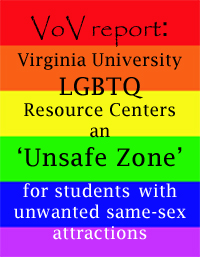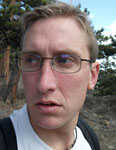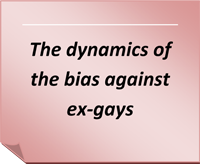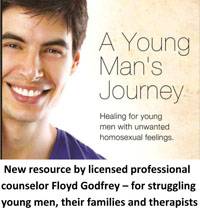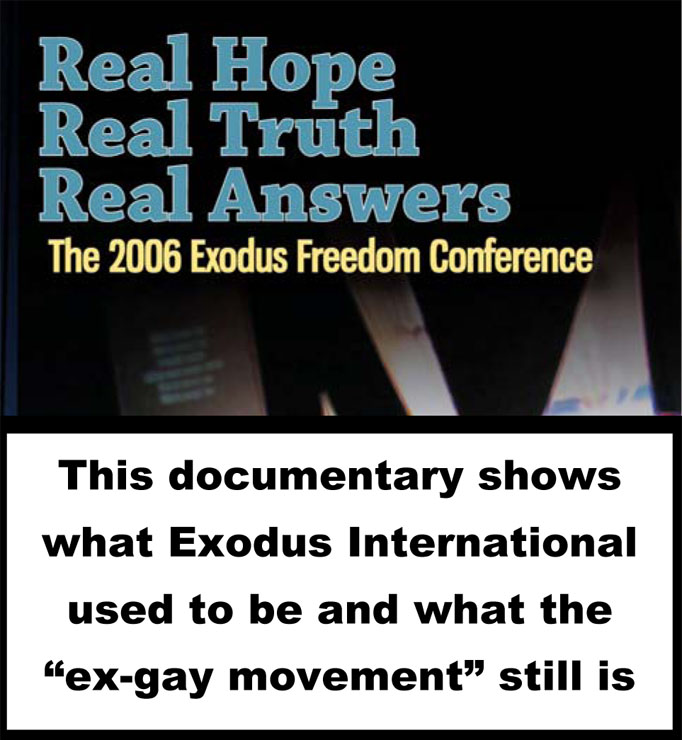Yvette Schneider
Source:
Compiled by Thomas Coy from Yvette’s testimony in God’s Grace and the Homosexual Next Door. Yevette’s testimony is used by permission from Harvest House Publishers.
Born:
Family Status:
Married to Paul; two daughters.
General Information as of 2010:
Yvette Schneider is a homemaker, author and speaker. She authors materials for athletic ministries, including Bridging the Gap: Reaching Lesbian-identified Women with the Love of Christ. Yvette and her husband home school their two daughters.
Personal Testimony:
Yvette’s testimony from God’s Grace and the Homosexual Next Door is also on the One by One website. Over half of Yvette’s original testimony is edited out to fit the Ex-gay Encyclopedia format.
“I grew up in a family where there wasn’t any hope that life was good – there was no confidence that our lives had meaning, or that there was purpose for our being here on earth.”
“I was very distant from my parents when I was growing up. My dad spent all of his time sitting in a chair reading the newspaper and doing crossword puzzles. My mom was a rage-aholic. She screamed and yelled constantly about anything and everything. I was terrified of my mother, but at the same time I really wanted love and affirmation from her. I did great in school. I was a great athlete. But nothing I did seemed to make my mom like me.”
“My younger sister was the extroverted, cute daughter. It seemed like it was easier for my parents to love her and give her attention than it was for them to love and give attention to me. I grew up feeling unlovable. When I was at home, I spent most of my time alone in my room. I thought, surely there has to be more to life than this.”
“But when I was in high school, I had a best friend. We were together all the time. For the first time in my life I felt loved and appreciated for who I was. It was great. Suddenly my life was completely transformed. It was vibrant and exciting, like in the Wizard of Oz when everything goes from black and white to Technicolor. My life finally had meaning.”
“So I didn’t care when my mom sat me down and told me that she and my dad were getting a divorce. What did I care? They had been fighting for as long as I could remember.”
“But I did care when my mom sat me down and asked me if my friend and I were having a homosexual relationship. I was devastated. How could my mom think that of me? I ran out of the room and locked myself in the bathroom. But later that night when I was crying in my room, I had to admit to myself that deep down inside I wished we were having a homosexual relationship – because then she would never leave me, and I would always feel the way I did then.”
“After high school, I went to college at the University of California at Irvine. I majored in English. I wanted to be a writer. I got good grades; I was president of the pledge class of my sorority; I was editor-in-chief of the yearbook my freshman year, yet I still felt empty and unfulfilled.”
“I thought, there’s got to be more to life than this. So I went to a therapist to find out what was wrong with me. After a few appointments, the therapist said, “Yvette, there’s nothing wrong with you. You just expect too much from life. You have to learn to lower your expectations.” I thought, how on earth am I supposed to do that?”
“My dissatisfaction with life was starting to get to me. I needed a change, so I applied for the University of California’s Education Abroad Program at the University of Delhi in India so I could study Hinduism and Buddhism for a year. I thought that maybe I could find some meaning to life.”
“When we got to India, we went up to the Himalayas to learn Hindi. While I was there, I became good friends with my Hindi teacher. After several months, at her initiation, the relationship became physical. The next day I was horrified by what I had done. This couldn’t be who I was. I spent the day walking through the foothills of the Himalayas. From where I was, I could see the majestic snow-covered peaks up above and a tiny ribbon of water below that was the Jammu River. I felt so small and insignificant in comparison. But at the same time, I was consumed with inner turmoil. I didn’t want to identify myself as a lesbian. But I was feeling loved and appreciated by this woman and I couldn’t walk away from that. Somehow I had to reconcile the fact that I thought homosexuality was wrong with the fact that I was getting my emotional needs met through a homosexual relationship.”
“I finally decided that the only reason I thought homosexuality was wrong was because that was what my oppressive, controlling Judeo-Christian culture had taught me. So I determined that once I got back to California, I would fight the oppressor. And in my mind, the oppressor was society.”
“I went to a lesbian bar in Long Beach, and met someone right away. We started spending all of our time together – as was my pattern. So I moved in with this woman. Everything was great for awhile. But it wasn’t long before we became jealous, obsessive and possessive. She knew exactly how far it was for me to go from our house to work and back, so she would check the odometer on my car to make sure I had come directly home. One day our relationship had become so dysfunctional because we expected each other to meet our every emotional need that she became violent with me. She ended up ripping the phone out of the wall and throwing it at me, barely missing my head. I thought, what have I gotten myself into? But I couldn’t leave. She was beautiful and popular, and I wasn’t. I needed to be around someone like that.”
“As my relationship got worse, I became more militant in my gay activism. I was working for a law firm in downtown L.A. I wore a pink triangle to work every day so everyone would know I was gay. I was out and I was proud. Closeted homosexuals would confess their fears to me, and I would say, “Every time you don’t stand up for who you are, you oppress not only yourself but every other person involved in homosexuality.””
“I joined GLAAD, the Gay and Lesbian Alliance Against Defamation. I went to every Gay and Lesbian Pride Parade in southern California, and I fought with the Christians who would carry their 1 Corinthians 6:9 signs saying how homosexuals would not inherit the kingdom of God. And every year, I would try to pick a fight with them. I would go up to them and say, “If you don’t like it, leave. No one invited you. And guess what? If you’re going to be in heaven, then I have no desire to go there.” Every time I argued with those Christians, I could get at least one of them to yell at me; and when I did, I knew that I had won.”
“But one Saturday, some friends and I were going out to a lesbian bar in Long Beach. From a distance, I could see a man and a woman handing out fliers. I thought maybe there was new restaurant or shop opening. As I got closer, I could hear them talking and I knew that they were Christians. I was instantly irritated and started walking straight toward them. My friends said, “Just ignore them. Who cares what they have to say?” But I went up to them and said, “Don’t you have anything better to do on a Saturday night than to stand here and harass us?” The man said, “I am so sorry. I don’t mean to offend you. You can take this tract and read it, or you can throw it away. It’s up to you. But I just came here to tell you how much Jesus loves you.” When he said that, I felt about 2 inches tall. I thought, what’s wrong with me? This guy isn’t the mean one, I am. It didn’t stop me from going into the bar that night. But it did begin to challenge my beliefs about Christians.”
“Around this time, my boss at the law firm promoted me to a new position. It sounded great, until I learned that I would be leading a new department with a young man named Jeff who was a notorious Christian.”
“Jeff and I would get into debates on things like premarital sex and abortion – never homosexuality – and Jeff would always use the Bible to support his points. I said, “I don’t believe the Bible, and I don’t care what it says.” Jeff said, “It doesn’t matter if you believe the Bible or not, it’s true.” This exasperated me. Whatever Jeff believed he could back up by quoting the Bible.”
“Whatever I believed, I couldn’t back up at all. I would go home at night and look over my books on eastern mysticism. I was getting more and more involved in Native American mysticism and occult activities, but I couldn’t give one practical answer for daily living, and Jeff could.”
“What’s more, even though I was always mean to Jeff, every time he thought he had offended me, he would apologize. I never apologized to him, and I offended him all the time. I couldn’t understand why he was nice to me and exhibited so much humility toward me. I hated it. It made me feel mean and nasty.”
“So after working with Jeff 8 hours a day, 5 days a week for 2 years, and hearing him talk about God every day, I finally went to church. When I stepped inside I could feel the presence of God so strongly that I couldn’t even stand up during worship. I just sat there with my head in my hands.”
“After church, the girl sitting next to me asked me what I was going to do about Jesus. I said, “What am I supposed to do?” She said, “Jesus took all of our sins upon Himself and paid the price of death so we can have everlasting life. You need to repent of your sins and accept Jesus as your Lord and Savior.” I said, “Okay.” And that’s what I did. It was as if a huge weight was lifted off my shoulders. I experienced joy and peace for the first time in my life. But most of all I experienced the thrill of hope – the assurance that life did have meaning, that there was a purpose for my life.”
“My old friends wanted nothing to do with me now that I was a Christian. One of my friends said, “I knew you were malleable, but I didn’t know you were that malleable.”
“My best-friend said, “As a Jew, you offend my spirit. There is no reason for us to ever get together again, or even to talk over the phone.” A lesbian couple who had been friends of mine for years wouldn’t even let me in their house once they heard I had become a Christian.”
“I overcame lesbianism, and now I have a great husband and two wonderful daughters. I know what it means to walk by faith and trust the Lord with my life. But by far the greatest thing of all is to see people come to know the Lord and knowing that one day we will all be in heaven together. Because when all is said and done, the only thing we can take with us is other people.”
Factors of Homosexual Causation:
Yvette experienced a childhood full of rejection. She remembers her father ignoring her and her mother screaming “constantly about anything and everything.” She was terrified of her mother, which is a psychological state that could hamper her identity with her mother and as a woman. Though terrified, she longed for her mother’s love and admiration. Yvette excelled in academics and athletics, but could not earn her mother’s love and never felt her mother even liked her. These factors alone do not cause same-sex attractions, but they could make her question the value of being a heterosexual woman and value of being married to a man.
Through lesbian experimentation Yvette had felt loved and appreciated. She had to reconcile the fact that although she felt homosexuality was wrong, she was able to get her emotional needs met through a homosexual relationship. It was easy to rationalize that lesbianism was right for her.
Motivations to Change:
Yvette did not have any Christian background or belief in God to cause her to have negative feelings toward homosexuality. She determined that her initial objections to her own homosexual identity were culturally ingrained, so once she accepted a lesbian identity she joined the gay political movement to change the cultural norms on homosexuality.
As with many lesbian relationships, “Everything was great for awhile. But it wasn’t long before we became jealous, obsessive and possessive.” Her lesbian relationship was as dysfunctional as her parents’ marriage.
Throughout Yvette’s life she had wondered if there was a greater purpose to life. Her study of Buddhism and Hinduism were part of that effort. It was not the Christians condemning homosexuality that brought Yvette to Jesus Christ, but the Christians who showed her kindness and how the Bible has answers for everyday living. Yvette was drawn to investigate what the Bible said about the purpose of life and the startling claim that God loved her very much.
Process of Change:
Little is said in the testimony on Yvette’s process of change. Obviously, it was a life-changing experience for Yvette to become a follower of Jesus. The day she humbled herself and repented of her homosexuality and other past sins, and she felt a huge weight lifted off her shoulders. Yvette had had some of her emotional needs met through lesbianism, but this was a lot different. Yvette felt joy and peace for the first time in her life. She also experienced hope – “the assurance that life did have meaning, that there was a purpose for my life.”
